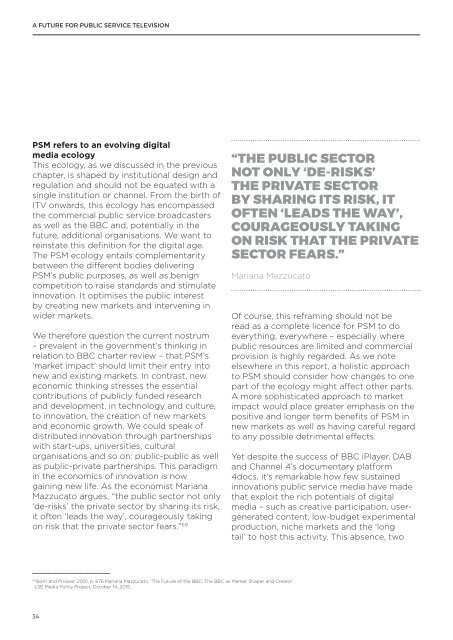A FUTURE FOR PUBLIC SERVICE TELEVISION CONTENT AND PLATFORMS IN A DIGITAL WORLD
FOTV-Report-Online-SP
FOTV-Report-Online-SP
Create successful ePaper yourself
Turn your PDF publications into a flip-book with our unique Google optimized e-Paper software.
A <strong>FUTURE</strong> <strong>FOR</strong> <strong>PUBLIC</strong> <strong>SERVICE</strong> <strong>TELEVISION</strong><br />
PSM refers to an evolving digital<br />
media ecology<br />
This ecology, as we discussed in the previous<br />
chapter, is shaped by institutional design and<br />
regulation and should not be equated with a<br />
single institution or channel. From the birth of<br />
ITV onwards, this ecology has encompassed<br />
the commercial public service broadcasters<br />
as well as the BBC and, potentially in the<br />
future, additional organisations. We want to<br />
reinstate this definition for the digital age.<br />
The PSM ecology entails complementarity<br />
between the different bodies delivering<br />
PSM’s public purposes, as well as benign<br />
competition to raise standards and stimulate<br />
innovation. It optimises the public interest<br />
by creating new markets and intervening in<br />
wider markets.<br />
We therefore question the current nostrum<br />
– prevalent in the government’s thinking in<br />
relation to BBC charter review – that PSM’s<br />
‘market impact’ should limit their entry into<br />
new and existing markets. In contrast, new<br />
economic thinking stresses the essential<br />
contributions of publicly funded research<br />
and development, in technology and culture,<br />
to innovation, the creation of new markets<br />
and economic growth. We could speak of<br />
distributed innovation through partnerships<br />
with start-ups, universities, cultural<br />
organisations and so on: public-public as well<br />
as public-private partnerships. This paradigm<br />
in the economics of innovation is now<br />
gaining new life. As the economist Mariana<br />
Mazzucato argues, “the public sector not only<br />
‘de-risks’ the private sector by sharing its risk,<br />
it often ‘leads the way’, courageously taking<br />
on risk that the private sector fears.” 69<br />
“THE <strong>PUBLIC</strong> SECTOR<br />
NOT ONLY ‘DE-RISKS’<br />
THE PRIVATE SECTOR<br />
BY SHAR<strong>IN</strong>G ITS RISK, IT<br />
OFTEN ‘LEADS THE WAY’,<br />
COURAGEOUSLY TAK<strong>IN</strong>G<br />
ON RISK THAT THE PRIVATE<br />
SECTOR FEARS.”<br />
Mariana Mazzucato<br />
Of course, this reframing should not be<br />
read as a complete licence for PSM to do<br />
everything, everywhere – especially where<br />
public resources are limited and commercial<br />
provision is highly regarded. As we note<br />
elsewhere in this report, a holistic approach<br />
to PSM should consider how changes to one<br />
part of the ecology might affect other parts.<br />
A more sophisticated approach to market<br />
impact would place greater emphasis on the<br />
positive and longer term benefits of PSM in<br />
new markets as well as having careful regard<br />
to any possible detrimental effects.<br />
Yet despite the success of BBC iPlayer, DAB<br />
and Channel 4’s documentary platform<br />
4docs, it’s remarkable how few sustained<br />
innovations public service media have made<br />
that exploit the rich potentials of digital<br />
media – such as creative participation, usergenerated<br />
content, low-budget experimental<br />
production, niche markets and the ‘long<br />
tail’ to host this activity. This absence, two<br />
69<br />
Born and Prosser, 2001, p. 676.Mariana Mazzucato, ‘The Future of the BBC: The BBC as Market Shaper and Creator’,<br />
LSE Media Policy Project, October 14, 2015.<br />
34


